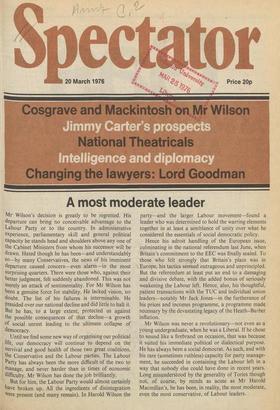A most moderate leader
Mr Wilson's decision is greatly to be regretted. His departure can bring no conceivable advantage to the Labour Party or to the country. In administrative experience, parliamentary skill and general political capacity he stands head and shoulders above any one of the Cabinet Ministers from whom his successor will be drawn. Hated though he has been—and understandably so—by many Conservatives, the news of his imminent departure caused concern—even alarm—in the most surprising quarters. There were those who, against their better judgment, felt suddenly abandoned. This was not merely an attack of sentimentality. For Mr Wilson has been a genuine force for stability. He lacked vision, no doubt. The list of his failures is interminable. He Presided over our national decline and did little to halt it. But he has, to a large extent, protected us against the possible consequences of that decline—a growth of social unrest leading to the ultimate collapse of democracy.
Until we find some new way of organising our political life, our democracy will continue to depend on the survival and good health of those two great coalitions, the Conservative and the Labour parties. The Labour Party has always been the more difficult of the two to manage, and never harder than in times of economic difficulty. Mr Wilson has done the job brilliantly.
But for him, the Labour Party would almost certainly have broken up. All the ingredients of disintegration were present (and many remain). In Harold Wilson the party—and the larger Labour movement—found a leader who was determined to hold the warring elements together in at least a semblance of unity over what he considered the essentials of social democratic policy.
Hence his adroit handling of the European issue, culminating in the national referendum last June, when Britain's commitment to the EEC was finally sealed. To those who felt strongly that Britain's place was in Europe, his tactics seemed outrageous and unprincipled. But the referendum at least put an end to a damaging and divisive debate, with the added bonus of seriously weakening the Labour left. Hence, also, his thoughtful, patient transactions with the TUC and individual union leaders—notably Mr Jack Jones—in the furtherance of his prices and incomes programme, a programme made necessary by the devastating legacy of the Heath—Barber inflation.
Mr Wilson was never a revolutionary—not even as a young undergraduate, when he was a Liberal. If he chose to sound like a firebrand on occasion, that was because it suited his immediate political or dialectical purpose. He has always been a social democrat. As such, and with his rare (sometimes ruthless) capacity for party management, he succeeded in containing the Labour left in a way that nobody else could have done in recent years. Long misunderstood by the generality of Tories though not, of course, by minds as acute as Mr Harold Macmillan's, he has been, in reality, the most moderate, even the most conservative, of Labour leaders.


































